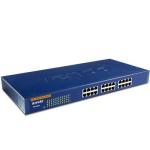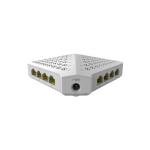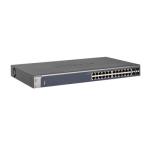Description
Overview
The HP E5400 zl Switch Series consists of advanced intelligent switches in the HP E-Series product-line. The E5400 zl series includes 6-slot and 12-slot chassis and associated zl modules and bundles. The foundation for all of these switches is a purpose-built, programmable ProVision ASIC that allows the most demanding networking features, such as quality of service (QoS) and security, to be implemented in a scalable yet granular fashion. With 10/100, Gigabit Ethernet and 10 Gigabit Ethernet interfaces, choice of PoE+ & Non-PoE, integrated layer 3 features and HP allianceONE Solutions, the E5400 zl switches offer excellent investment protection, flexibility, and scalability, as well as ease of deployment, operation, and maintenance.
Features
Quality of Service (QoS)
Advanced classifier-based QoS: classifies traffic using multiple match criteria based on Layer 2, 3, and 4 information; applies QoS policies such as setting priority level and rate limit to selected traffic on a per-port or per-VLAN basis
Management
Remote Intelligent Mirroring: mirrors selected ingress/egress traffic based on ACL, port, MAC address, or VLAN to a local or remote E8200, E6200, E5400, or E3500 switch anywhere on the network
Connectivity
IEEE 802.3az Energy Efficient Ethernet: Lowers power consumption in periods of low link usage. (Supported on v2 zl 10/100/1000 & 10/100 modules)
Performance
High-speed/capacity architecture: 1 Tbps crossbar switching fabric provides intra-module and inter-module switching with 585.6 million pps throughput on the purpose-built ProVision ASICs
Resiliency and high availability
Virtual Router Redundancy Protocol: allows groups of two routers to dynamically back each other up to create highly available routed environments
Layer 2 switching
HP’s switch meshing: dynamically load-balances across multiple active redundant links to increase available aggregate bandwidth
Layer 3 services
User Datagram Protocol (UDP) helper function: allows UDP broadcasts to be directed across router interfaces to specific IP unicast or subnet broadcast addresses and prevents server spoofing for UDP services such as DHCP




